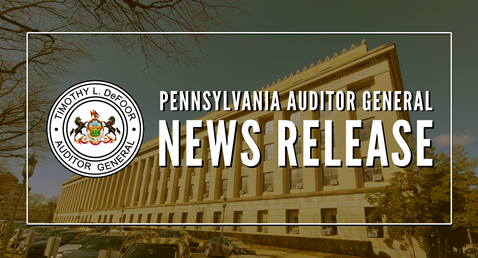Auditor General DePasquale Says Audit of Millcreek Township School District Finds Serious Management, Fiscal Problems
District Must Do More to Become Accountable to Taxpayers
Auditor General DePasquale Says Audit of Millcreek Township School District Finds Serious Management, Fiscal Problems
District Must Do More to Become Accountable to Taxpayers
ERIE (July 16, 2013) – Auditor General Eugene DePasquale today said that immediate and significant changes are needed at the Millcreek School District in Erie County, where auditors found a lack of school board oversight and an ineffective administration resulted in widespread fiscal mismanagement and lax recordkeeping.
“Millcreek Township School District’s audit results could be used as a script for a remake of the Keystone Cops – blunder after blunder,” DePasquale said. “This district represents a fairly affluent area and they certainly have the resources to ensure that taxpayer dollars are managed in a responsible way. That has not been the case and I certainly hope that the district gets its act together not only for the citizens who foot the bill, but also for the children who attend schools there.”
The most recent audit found significant incidents of noncompliance with state laws and administrative procedures. Specifically, auditors found that the Millcreek Township School District:
- failed to provide the school board with complete monthly financial accounting of revenues, investment income, cash flow, disbursements, treasurer’s reports and restricted and unrestricted cash available;
- did not develop accurate budgets and as a result the districts’ expenditures outpaced revenue, resulting in the district’s general fund balance declining more than 52 percent from $8.9 million to $4.2 million over a four-year period;
- improperly handled capital project funds by transferring $5 million from its capital projects fund to the general fund without proper board approval to cover a cash shortfall to avoid taking a tax anticipation note;
- failed to recoup through an insurance claim restitution on $4,300 that was illegally removed from a student activity account;
- did not apply in a timely fashion for reimbursements for school construction projects totaling $3.1 million resulting in the loss of an opportunity to earn interest on the funds;
- failed to properly bill for more than $2.1 million in tuition for charter schools, out-of-district students and a special education programs;
- implemented a questionable taxpayer benefit agreement with a local hockey team that permitted out-of-district hockey players, many from Canada, to attend district schools tuition free in exchange for free hockey game tickets, radio and in-arena advertising for the district, and educational service hours by the team’s players; and
- failed to maintain sufficient controls over student data and lack of appropriate monitoring of vendor activity on the district’s computer system.
“While the district says it is moving to correct the problems identified in our audit, they must continue to make a full-court press to ensure that these sloppy, wasteful business practices are not repeated,” DePasquale said.
To resolve the issues identified in the audit, DePasquale recommended numerous policy and procedural changes, including:
- ensure that the board secretary, district treasurer and district administrative personnel present monthly and annual reconciliation reports and other financial information necessary for the board to make accurate and sound financial decisions;
- revise the district’s budget process to ensure that it develops realistic revenue and expenditure projections;
- ensure that funds are expended in accordance with the purposes identified in the bond resolution;
- file all insurance claims in a timely manner to ensure reimbursement for misappropriated funds;
- establish formal procedures for the filing of fund reimbursement applications;
- create an internal control review process to make sure business office personnel are properly billing for tuition in a timely manner using correct tuition rates.
- implement written guidelines governing the agreement with the hockey team and document the actual recipients of free tickets and ensure the benefits received under the agreement are in the best interest of the district’s taxpayers; and
- prepare and implement procedures to ensure the correct management of student data and improve controls over vendor access to student information.
The department’s Bureau of School Audits examines the records of school districts, charter schools, intermediate units, and area vocational-technical schools. The audits — among other things — assess whether or not school districts received the state subsidies and reimbursements to which they were entitled, accurately managed taxpayer funds, and complied with ethics codes. The audits also determine whether or not teachers and administrators were properly certified for the positions they held during the audit period.
# # #
